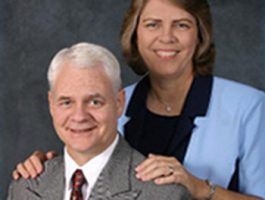
Forgetting What Lies Behind . . .
John Bishop's memory was erased by illness. Hear about his courageous journey back!
Show Notes
About the Host
About the Guest
-
John Bishop's memory was erased by illness. Hear about his courageous journey back!
-
Dave and Ann Wilson
Dave and Ann Wilson are hosts of FamilyLife Today®, FamilyLife’s nationally-syndicated radio program. Dave and Ann have been married for more than 38 years and have spent the last 33 teaching and mentoring couples and parents across the country. They have been featured speakers at FamilyLife’s Weekend to Remember® marriage getaway since 1993 and have also hosted their own marriage conferences across the country. Cofounders of Kensington Church—a national, multicampus church that hosts more than 14,000 visitors every weekend—the Wilsons are the creative force behind DVD teaching series Rock Your Marriage and The Survival Guide To Parenting, as well as authors of the recently released book Vertical Marriage (Zondervan, 2019). Dave is a graduate of the International School of Theology, where he received a Master of Divinity degree. A Ball State University Hall of Fame quarterback, Dave served the Detroit Lions as chaplain for 33 years. Ann attended the University of Kentucky. She has been active alongside Dave in ministry as a speaker, writer, small-group leader, and mentor to countless wives of professional athletes. The Wilsons live in the Detroit area. They have three grown sons, CJ, Austin, and Cody, three daughters-in-law, and a growing number of grandchildren.
-

John and Donna Bishop
In October 1995, Pastor John Bishop lost his memory to Aseptic Meningitis. His wife, Donna, stood by his side helping him to learn how to walk, talk, read, and write all over again. He has gone on to found God Is So Good Ministries traveling the country to speak as well as maintaining a Christian Bible Camp. The Bishops reside in Rosebud, Arkansas.
John Bishop’s memory was erased by illness. Hear about his courageous journey back!
Forgetting What Lies Behind . . .
Bob: So it came on in an instant like that—one night?
Donna: No, he had been a little sick, just having headaches and so forth. Then, it just started getting severe that night; and we just took him to the hospital.
Bob: Were you scared?
Donna: In a way, you know, because the pain just kept getting worse. You know, you always think, "Oh, we can take him to the hospital; and he will be fine." You know, "Be home tomorrow."
Dennis: Right.
Donna: But he was there about five days, six days. He got to feeling better; and, of course, once men start feeling better, they want to get out of that hospital. He got out of the hospital and came home. It was almost one month to the day he got out of the hospital—is really when, I believe, the damage was done or, that is, when something happened.
He was sitting in his rocking chair—had his devotions over in a rocking chair. He just kept sitting there and sitting there. I thought, "Okay," you know, "let's get on with things;" and he just kept sitting there.
I went over and shook him, and he couldn't wake up. He couldn't –he was just kind of staring off. I said, "John, what's the matter, John?" I was talking to him, and he just couldn't answer me. Then, of course, we took him back to the doctor; and it was just from there on—it's been slow go.
Bob: Now, the diagnosis was aseptic meningitis?
Donna: Yes, sir.
Bob: And this is not what usually happens to people who have meningitis; is it?
Donna: No, sir. You know, I don't know, I'm not a doctor; but I don't know if we didn't give him the medicine long enough or exactly what it is. But I know the Lord has a reason for it, and so—because that was when everything started going downhill—you might say, to us, you know, because he couldn't walk. We had to help him around, and his eyes were distorted. He couldn't drive, and he couldn't –well, he didn't know how to read. He forgot how to read.
Dennis: And, ultimately, he lost all of his memory prior to 1995?
Donna: Yes, sir. I kept thinking, "Okay, now, he'll get it back." He didn't remember marriage or wedding. I get our photo album out; and I said, "Don't you remember?" I'd try to trick him to see, "Okay, now, I know he can remember something!" and I just kept trying to go back. But he just doesn't have anything.
Dennis: In 1995, you'd been married how long?
Donna: Twenty-four years.
Dennis: Twenty-four years, had three children, you were pastoring a church, and you'd started a ranch?
Donna: Yes, sir. It's a youth camp—a church youth camp for boys and girls that come there.
Dennis: All right, John, back to you. How do you develop a relationship with a wife that you don't remember marrying?
Bob: Well, you didn't even know what marriage was; did you?
John: No, I didn't. When she began to teach me, she said, "You're John. I, Donna—we're married." The way I learned to talk, Bob, in those early days—I'd watch people's lips move. I wasn't blind then. I've only been blind about eight months.
I would watch people's lips move and put the sound with it. I said, "Marry? Marry?" She said, "Oh, okay, you forgot that. That means you belong to me, and I belong to you." I looked at her. I say, "You my Donna?" She said, "Yes." That what I call her ever since—my Donna.
It was so easy love her. She loved me so good. I tell people she taught me everything I know—every woman dream come true. Her husband forget it all, and she get teach him. (Laughter)
Everything I know is what my wife taught me. I tell everybody she taught me reading, writing, and kissing; and my favorite subject—kissing—that my favorite one.
Dennis: So that didn't change?
John: No, that didn't. I didn't—I had a hard time finding her lips; but I kiss till I find them. That's what I do. (Laughter)
Dennis: Donna, what kind of student was he?
Donna: He worked hard; he really did. He's a good, pretty good, student. Sometimes when he's done—he's done, you know? Sometimes he'd tell me—he said, "Remember, I'm the husband." (Laughter)
Dennis: Oh, so he did find out what that meant?
Donna: Oh, yes. It didn't take him long to have that man thing, I guess.
Bob: It's one thing to take your husband to the hospital and, maybe, he comes home with a physical disability. Now life is going to have to change because he has to use a walker, or he's got to be in a wheelchair, or he's got something physically that's an issue. But to have a husband come home—
I had a friend describe your husband's condition by saying, "It's like a computer that had the hard disk completely erased. There is no data left there." To have that be the situation—and to be a wife and going, "This is the man I went to Bible school with and raised my kids, and he can't remember any of it. Our shared history is gone." That had to be—I can't even imagine the discouragement that you must have felt.
Donna: It was very discouraging. That's why I kept trying to do those tricks, trying to think, "Okay, he's got to remember something." You know? It was hard. It was almost like I had four boys, instead of three.
Dennis: Was there anything to prepare you for the kind of commitment this was going to take? I mean, marriage is a covenant; but your commitment was challenged to the core; wasn't it?
Donna: Yes, sir, it sure was. I thank the Lord. I think the main reason was because I had a good home church when I grew up. I went to church faithfully. My parents loved each other; and I was always taught that when you're married, you're married for life. When you say, "For better, for worse, in sickness and health," you're in for the long haul, you know? I never even thought about divorce. That never even crossed my mind.
In a way, I guess I just busied myself into fixing the problem, you know? “Okay, we've got a problem here. We need to start working on it. Lord, you've just got to help give me wisdom to know”—because, also, all the decisions that he made as the husband, now were put on me as far as my children, and how many doctors to go to, and who to go to, and who not to go to. I always tell ladies now—I say, "Listen, you need to thank the Lord for your husband's leadership."
I mean, I was always thankful for my husband to make the decisions and so forth; but when I had to take that role, it was just something that made me appreciate the position that God has given me to be under my husband so that he could make those decisions for me. I'm just very thankful that I was taught those things, and God's just really helped me through these things.
Dennis: How old were those children at the time?
Donna: My youngest was 10; the next one was, like, 17; and my other one was, like, 22, I think.
Dennis: Wow, there was a lot going on in your life, just raising them.
Donna: Yes, sir.
Dennis: Now, John, I want you to know we haven't forgotten you.
John: Okay.
Dennis: We know you're here, but we have to get a little bit of the drama that's taking place.
John: Yes.
Dennis: You came out of the hospital and arrived back home. You were in a state of—was it almost like paralysis?—or were you just—You couldn't walk; you couldn't talk. You could see. You had eyesight; right?
John: Yes, uh-huh.
Dennis: You could hear.
John: Yes.
Dennis: But you didn't know how to eat?
John: No, and I didn't know what words were. That's why I couldn't read or write. My Donna taught me phonics, finally. My 10-year-old son would come home from school, sit on the couch, and help Daddy learn to read.
My oldest son was in college, the other just finishing high school—then going college—but my family just so good to me—people were just so good. My church was so—I remember—even when she brought me home from hospital that one time. They opened the door of car. My dog, golden retriever, came over, put head in lap. I said, "Even my dog love me."
It wasn't really a bad world to wake up to because everybody in it love me. You know, my first memories—of anything about life was my Donna rubbing my hand, telling me, "I love you. It will be alright. Everything will be alright," and—
Dennis: You knew what those words meant?
John: In some way I did. She would have to then sort of point out to me what, like, words "good" and "bad" meant; and it's hard to really explain. It was just a blank. So she would begin to do—teach me these different things. Then as I began to pick up concepts is what it was.
The way I picked up on reading—I couldn't figure out what letters on books— “How are they reading?” Until one day—she got me dressed for church and sat me in the living room. On coffee table was a kindergarten book she going to teach that morning—Sunday school and big pictures—Bible story.
What I did, Dennis. I would listen to the Bible every day on tape because I couldn't read. I would listen to two tapes a day, three hours. I remember when she told me what the Bible was. See, I didn't know what I was, either. I said, "What am I?" She said, "You a preacher." I said, "What a preacher is?" She said, "Well, that's somebody tell others what God want them know." I said, "Wow! I couldn't be thing better that. You reckon Lord let me keep doing it?"
I began to learn concepts. When I saw those pictures and the big words underneath it, "Moses" and "Red Sea," then I knew that was what I'd been listening to in Bible. I hollered, "Donna, I can read! I can read!" Then I knew what words were, and so that's how I began learning.
Dennis: Yes. How did you know who God was?
John: You know, I knew I knew God; but I didn't know how I knew God. Matter of fact, in the hospital, one of my doctors said this—I would mumble things because I knew I supposed to say things, but I didn't know how to. My doctor said, “The only word we could make out was the word, ‘God.’" It was, like, Dennis, I forgot everybody and everything but God.
But I didn't know how I knew Him until through the Bible, listening. Of course, my family telling me, "You're a Christian;" but I didn't know what that was. You know, my church told me, and they loved me, and so forth; but it was a process of me learning and listening to the Bible. What gave me the great assurance was Romans, Chapter 8, where he says, "His Spirit bear witness with our spirit that we're children of God."
I'd gotten a little worried. You know, it was—when I'd listen to the Bible—Judas Iscariot scared me because I thought, "Here a preacher that didn't really know or love the Lord." I thought, “Just because I preacher doesn't mean I really know the Lord. Just because people tell me—but when I listened to that verse, it was like God said, "John, it My job tell you you're My child. That's my Spirit witnessing.” After that, I never had doubt. After that, I had that assurance in my heart from this Word. “That's how I know You, God;” but I can't remember praying a prayer.
I wrote it in my Bible, as a teenage boy; and I've still got that. Some people, Dennis, just put a date. I wrote a whole page, and I treasure that. God knew I'd lose it all one day, and I had a whole page. I was brought up in a lost home. My dad and stepdad had died before my illness, so I don't have any memory of them; but my mother was still alive.
She with the Lord now, and Mama told me that I from an alcoholic home. She said, "John, I'm glad you forgot your childhood. It was real rough." But she said I led my dad to the Lord before he had died; my stepdad; and I led her to the Lord.
You know, I told my family, "Don't tell me everything—just what I need to know because you don't really want to know everything sometime." When I went to Mama's funeral, my aunt came up and said, "John, you used to send your mom a rose every year for she was sober after she got saved." I said, "Stella, what would this be?" She said, "It would be 12." So I bought 12 roses and put there; and my aunt and I knew what it was.
The Lord has been good to help me, and I so glad Mama got to. She'd one day telling me about childhood. I said, "Boy, Mama, I didn't know I was such a good boy." She said, "Remember, I just tell the half of it." (Laughter)
Bob: [studio] Well, we've been listening today to Part One of an incredible story as we have talked to John and Donna Bishop about what the Lord took them through. This is more than a decade ago, now, Dennis.
You know, all of us, as we shared our vows with one another getting married—we pledged, “For better, for worse, in sickness and in health;” and we may have stopped to think, "Well, how bad can it be?" or "How sick can somebody get?" Who could imagine a scenario like this—like what Donna faced? It's remarkable.
Dennis: It really is, Bob. I just want to let our listeners in on a little secret. Don't miss the rest of the story—just the love story that we've heard of Donna Bishop, hanging in there with her husband. I know we're talking to some spouses right now who are hanging in there with the person they pledged through “sickness and in health, for better, for worse”; and right now, it is sickness; and it's worse.
You needed to hear the story to give you courage. I just want to read you Paul's great writing about what love is because the world cheapens what love is. The Bible speaks so clearly. I'm not going to read all of it; but 1 Corinthians 13, verse 4, "Love is patient; love is kind. It's not jealous, does not brag, and is not arrogant." Verse 7, "It bears all things, believes all things, hopes all things." Now, listen to these last three words—“endures all things."
The only way you get that kind of love is by knowing the God—the God who redeemed John and Donna Bishop and who put that kind of love in their hearts for one another.
Bob: And that is, as they used to say, "The genuine article." You know, it was not long after we did this interview that I asked if I could get a couple of CD copies and sat down with a group of guys that I meet with on Wednesday nights. I played a portion of that interview for them. Just about all of them said, “How can I get a copy of that CD?” because they wanted their wife to hear it. They wanted friends to hear it.
We do have CDs of our conversation with John and Donna available in our FamilyLife Today Resource Center. Of course, these programs are available for audio download as well at no cost. You can go to our website, FamilyLifeToday.com, for more information on how to order copies of the CDs if you want to have them to hand out to others.
Or if you’d like to download the audio, again go to FamilyLfieToday.com or call us and we can send you the CDs. Our toll-free number is 1-800-FL-TODAY, 1-800-“F” as in family, “L” as in life and then the word, “TODAY”. That’s 1-800-358-6329. Get in touch with us, and we’ll have that sent out to you.
Now, I know there is a lot going on in people’s lives with Christmas coming up this Sunday. I still have a few things I need to take care of before we can settle in for our Christmas celebration with our family. But we’re hoping that many of our listeners, over the next couple of days, will take just a few minutes to either go online or call us and help us be able to take full advantage of the matching-gift fund that has been established here for FamilyLife at year-end.
We have seen that matching-gift fund to grow to now a total of $3.5 million, and it’s continuing to grow. We are hopeful that we are going to be able to take full advantage of that matching-gift opportunity. But honestly, if that’s going to happen, we need to hear from as many of you as possible. We need you to be as generous as you can possibly be.
So, can I ask you to go to FamilyLifeToday.com and make an online donation? Just click the button that says, “I Care”, and you can make your donation online. Again, when you do, you donation is going to be matched dollar for dollar up to that $3.5 million total which, again, is continuing to grow. Or call to make a donation: 1-800-FL-TODAY is our number; 1-800-358-6329, 1-800-“F” as in family, “L” as in life, and then the word, “TODAY”.
Again, we want to say, “Thanks,” in advance for whatever you are able to do. Hope you have a wonderful Christmas, and thanks for your support of FamilyLife Today. And we want to encourage you to be back with us tomorrow when we’re going to hear Part Two of our conversation with John and Donna Bishop. We’ll hear more of their story, and I hope you can be here for that.
I want to thank our engineer today—his name is Keith Lynch—and our entire broadcast production team. On behalf of our host, Dennis Rainey, I'm Bob Lepine. We'll see you back next time for another edition of FamilyLife Today.
FamilyLife Today is a production of FamilyLife of Little Rock, Arkansas.
Help for today. Hope for tomorrow.
We are so happy to provide these transcripts to you. However, there is a cost to produce them for our website. If you’ve benefited from the broadcast transcripts, would you consider donating today to help defray the costs?
Copyright © 2011 FamilyLife. All rights reserved.
1



